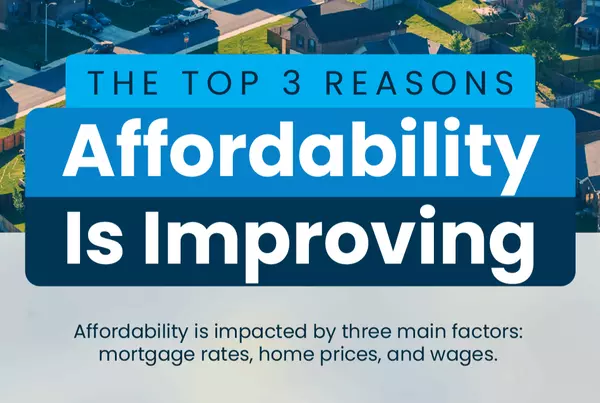
Two Reasons Why the Housing Market Won’t Crash
Two Reasons Why the Housing Market Won’t Crash You may have heard chatter recently about the economy and talk about a possible recession. It's no surprise that kind of noise gets some people worried about a housing market crash. Maybe you’re one of them. But here’s the good news – there’s no need to panic. The housing market is not set up for a crash right now. Real estate journalist Michele Lerner says: “A housing market crash happens when home values plummet due to a lack of demand for homes or an oversupply.” With that definition in mind, here are two reasons why this just isn’t on the horizon. 1. Demand for Homes Is Higher than Supply One of the biggest reasons the housing market crashed back in 2008 was an oversupply of homes. Today, though, it’s a very different story. It’s a general rule of thumb that a market where supply and demand are balanced has a six-month supply of homes. A higher number means supply outpaces demand, and a lower number means demand outpaces supply. The graph below uses data from NAR to put today’s situation into context: The graph compares housing supply during three different periods of time. The red bar shows there were 13 months of supply before the 2008 crisis, which was far too much. The gray bar shows a balanced market with six months of supply, for context. And the blue bar shows there are only 4.2 months of supply today. Put simply, there are more people who want to buy homes than there are homes available to buy right now. So, demand is greater than supply. When that happens, home prices stay steady or rise – the opposite of a housing market crash. It’s important to note that inventory levels differ from market to market. Some areas may be more balanced, while a few could have a slight oversupply, which can impact prices locally. However, most markets continue to experience a shortage of homes. Lawrence Yun, Chief Economist at the National Association of Realtors (NAR), says: “We simply don’t have enough inventory. Will some markets see a price decline? Yes. [But] with the supply not being there, the repeat of a 30 percent price decline is highly, highly unlikely.” 2. Unemployment Is Still Low When people are unemployed, they’re more likely to have trouble making their mortgage payments and may be forced to sell or face foreclosure. That was a big problem during the 2008 financial crisis. Today, the employment situation is much more stable (see graph below): Again, this graph shows three different periods of time, but this one is the unemployment rate. The red bar represents the 2008 financial crisis when unemployment was very high at 8.3%. The gray bar shows the 75-year average of 5.7%. And the blue bar shows the unemployment rate today, and it’s much lower at just 4.1%. Right now, people are working, earning an income, and making their mortgage payments. That’s one reason why the wave of foreclosures that happened in 2008 isn’t going to happen again this time. Plus, since so many people are employed right now, many are actually in a position to buy a home, and this demand keeps upward pressure on prices. Today’s Housing Market Is Stronger than in 2008 While it’s understandable to be concerned when you hear talk of a recession and economic uncertainty, but know this: the housing market is in a much better place than it was in 2008. According to Rick Sharga, Founder and CEO at CJ Patrick Company: “Literally everything is different about today’s housing market dynamics than the conditions that led to the housing crisis.” Demand for homes still outpaces supply, and unemployment remains low. And these are two key factors that will help prevent the housing market from crashing any time soon. Bottom Line The housing market is doing a lot better than it was in 2008, but it’s important to remember that real estate is very local. So, it’s always a good idea to stay informed about our specific market. If you have any questions or want to discuss how these factors are playing out in our area, feel free to reach out.

Why Now’s Not the Time To Take Your House Off the Market
Why Now’s Not the Time To Take Your House Off the Market Has your house been sitting on the market longer than expected? If so, you’re bound to be frustrated by now. Maybe you’re even thinking it’s time to pull the listing and wait to see what 2025 brings. But what you may not realize is, the decision to hold off could actually cost you. Here’s a look at why staying the course could be the smarter move. Other Sellers Are Pulling Back. Should You Hold Off Too? According to recent data from Altos Research, the number of withdrawals is increasing – that means more sellers are opting to pull their listings off the market right now. And this isn’t unusual for this time of the year. In the housing market, there are seasonal ebbs and flows. Inventory levels typically start to drop off a bit headed into the fall season as some sellers delay their plans until the new year. As Mike Simonsen, Founder of Altos Research, explains: “. . . we’re seeing a more normal seasonal pattern now with inventory beginning to decline. We’re also seeing more home sellers withdrawing their listings to try again next year. In fact, for every two sales, there is another listing withdrawn from the market.” But is that a smart move? While it might seem like a good idea to pull your listing too, here’s why that approach may not pay off this year. Today’s Buyers Are Serious and Ready To Act The biggest reason to stick with your plan to sell now is that the buyers who are looking at this time of year are serious about making a purchase. They’ve been sitting on the sidelines for a while waiting for affordability to improve. And now that mortgage rates are down from their recent peak, they’re ready to make their move. Mortgage applications are rising – and that’s a leading indicator that buyers are preparing to jump back in. And since they’ve already put their needs on the back burner for so long, they’re even more eager than buyers usually are at this time of year. These aren’t window shoppers. They’re highly motivated buyers who want to move fast – and that’s the kind of buyer you want to work with. As Freddie Mac says: “During the fall months, serious homebuyers are eager to settle in to a new home before the holiday season ramps up and the winter weather begins.” By keeping your home on the market, you increase the chances of attracting people who are truly ready to make a purchase. Bottom Line While some sellers are choosing to take their homes off the market, this really isn’t the best move. With serious buyers eager to purchase, this is a great time to sell your house. Let’s connect to make sure we’ve got a strategy in place to make it happen.

Now’s the Time To Upgrade to Your Dream Home
Now’s the Time To Upgrade to Your Dream Home If you’ve been wanting to sell your house and move up to a bigger or nicer home, you’re not alone. A recent Inman survey reveals the top motivator for today’s homebuyers is the desire for more space or an upgraded home (see graph below): But there’s also a good chance you, like many other people, have been holding off on that goal because of recent market challenges. It makes sense – when you’re planning an upgrade that could increase your monthly housing costs, affordability has a huge impact on when you make your move. But there’s good news: now’s actually a great time to make that move happen. Here’s why. You Have a Lot of Equity To Leverage One of the key benefits in today’s market is the amount of equity you’ve likely built up in your current house over the years. Even with recent shifts in the housing market, national home prices have steadily grown, adding to the equity homeowners have today. Selma Hepp, Chief Economist at CoreLogic, explains it well: “Persistent home price growth has continued to fuel home equity gains for existing homeowners who now average about $315,000 in equity and almost $129,000 more than at the onset of the pandemic.” What does that mean for you? If you’ve been in your home for a few years, you’re probably sitting on a significant amount of equity. You can put that toward the down payment on your next home, helping keep the amount you borrow within a comfortable range. This can make upgrading more achievable than you might think. If you’re curious how much you’ve built up over the years, ask your real estate agent for a professional equity assessment. Mortgage Rates Have Fallen, Boosting Your Purchasing Power And there’s another big reason why now’s a great time to make your move: mortgage rates are trending down. Lower rates can help make your future monthly payments more manageable, and they also increase your purchasing power. As Nadia Evangelou, Senior Economist and Director of Real Estate Research at the National Association of Realtors (NAR), points out: “When mortgage rates fall, the interest portion of monthly payments decreases, which lowers the total payment. This makes it easier for more borrowers to . . . qualify for mortgages that may have been unaffordable at higher rates.” That gives you more flexibility when shopping for homes and may allow you to afford a house at a price point that was previously out of reach. A trusted lender can work with you to figure out the best plan for your budget. Bottom Line If you’re ready to sell your current home and find the bigger, nicer home you’ve been dreaming of, don’t wait. Your equity, paired with lower mortgage rates, puts you in a great position to make that move today. To make the best decisions and get the most out of your current market advantage, let’s connect so you have an expert guide through every step of the homebuying process.

The Top 3 Reasons Affordability Is Improving in the Real Estate Market
The Top 3 Reasons Affordability Is Improving in the Real Estate Market If you’ve been waiting to jump back into the housing market, now might be the perfect time to revisit your options. Several key factors are shifting in favor of buyers, making home affordability better than it has been in recent months. Here are the top three reasons why housing affordability is improving: 1. Mortgage Rates Are Trending Down After a period of volatility, mortgage rates are finally beginning to trend downward. As the graph shows, the 30-year fixed mortgage rate has been fluctuating since the beginning of 2023, but recent data points to a gradual decline. Lower mortgage rates mean reduced monthly payments, which can significantly improve affordability for homebuyers. With rates easing, you could lock in a more favorable rate now compared to earlier in the year. 2. Home Prices Are Moderating In addition to falling mortgage rates, home prices are also stabilizing. The year-over-year change in home prices shows a clear moderation, especially compared to the steep increases seen in 2022 and early 2023. This shift is creating more balanced conditions between buyers and sellers, offering an opportunity for those who previously felt priced out of the market. Moderating home prices mean that buyers may find more negotiable prices, making it easier to secure a home within their budget. 3. Wages Are Rising Faster Than Usual One of the most critical aspects of housing affordability is the balance between wages and home costs. The good news? Wages are rising at a faster rate than usual. As the graph highlights, the index of weekly payrolls for all workers in the private sector has been steadily increasing. With higher incomes, potential buyers have more purchasing power, which offsets some of the costs associated with buying a home. Why Now May Be the Perfect Time to Act If you've paused your home search because it felt too expensive, these factors indicate that now might be a great time to jump back in. Lower mortgage rates, stabilized home prices, and rising wages are aligning to create a more buyer-friendly environment. As these trends continue, the housing market could offer opportunities that were not available just a few months ago. Final Thoughts The combination of falling mortgage rates, moderating home prices, and rising wages is improving the overall affordability of homes. While it's always important to assess your financial situation before making a move, these positive trends suggest that the barriers to homeownership may be lower than they've been in a while. If you're ready to take advantage of these conditions, now could be the ideal time to explore your options and secure your dream home.
Categories
Recent Posts










